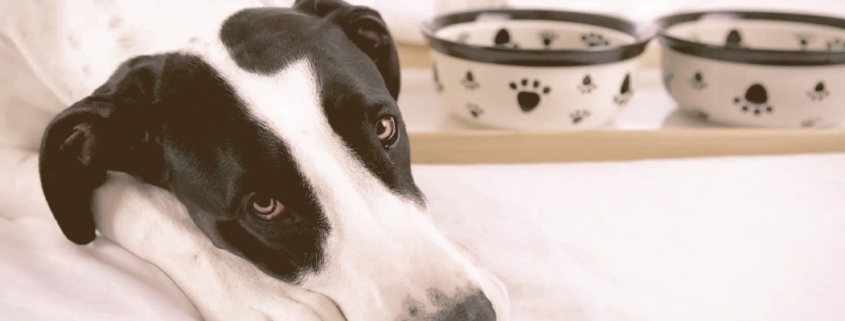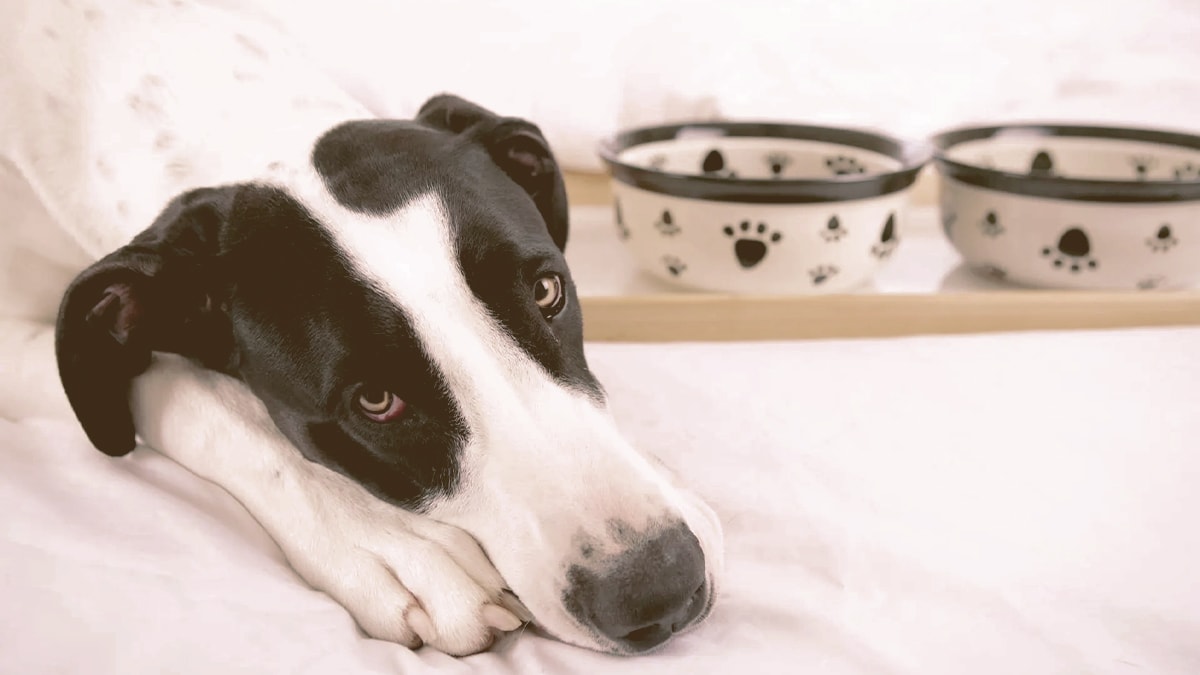
When to Take Your Dog to the Vet for Not Eating
Alex Vicente • Updated on August 2, 2023
- This review contains affiliate links. Read more here.
- Not a substitute for professional veterinary help.
Have you ever wondered when it is the right time to take your dog to the vet?
We never want to seem like we are calling for help when it is unnecessary, but it can be hard to not panic when your dog’s behavior changes.
Adult dogs can survive up to five days without eating, but this is not advised.
After two days of not eating, take an adult dog to the vet. A puppy should be taken to the vet if the period of not eating exceeds five hours.
For all dogs, lack of eating coupled with any other symptom of illness or weakness may signal something serious.
This article will help you identify what could be causing your dog’s lack of appetite and how to treat it.
It also includes some helpful tips on how to get them back into their normal eating routine as soon as possible.
ALSO READ: Best Dog Food for Small Breed Senior Dogs
Table of Contents
When To Take Your Dog To The Vet
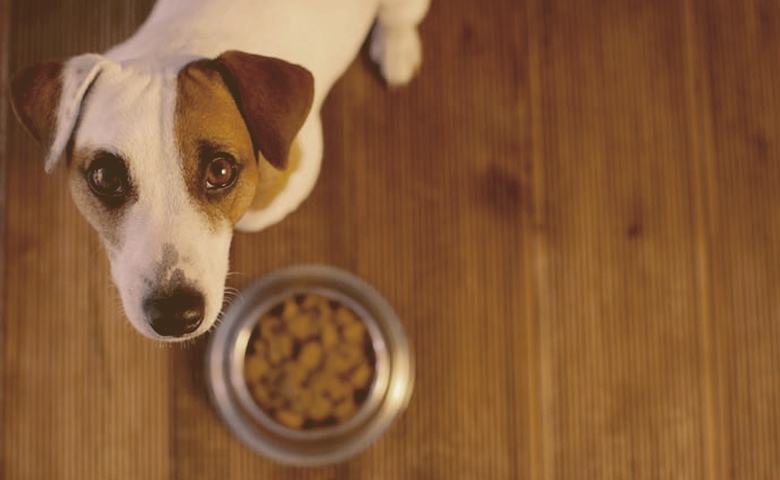
No matter when you notice changes in your dog’s eating habits, the sooner they are examined by a vet, the better. If your dog is not eating, it could be due to many different reasons.
If your dog has been refusing food for more than 48 hours, it may be time to take them to the vet, especially if they are exhibiting any other symptoms.
There are many reasons why dogs might refuse food, and some of these can be serious. The sooner you get help from a veterinarian, the better chance your pet will make a full recovery.
Reasons Your Dog May Have Stopped Eating
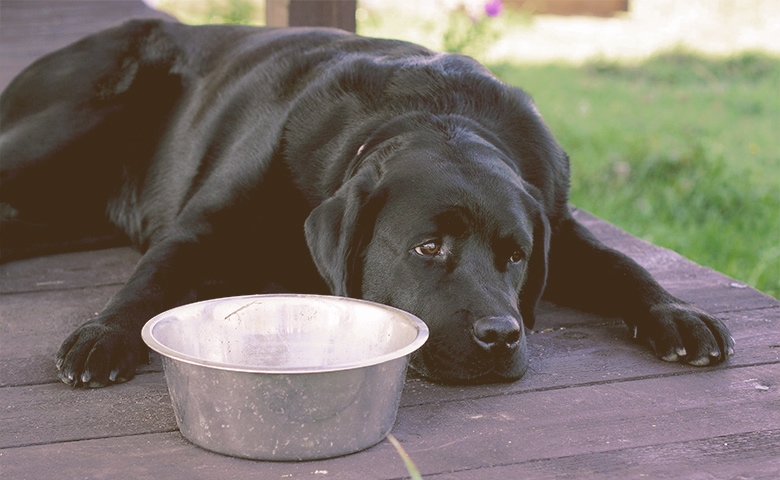
Some of the most common causes of not eating are:
- Stress
- Illness
- Change in diet
- Underlying medical conditions, such as kidney disease or diabetes.
The best thing for your pet is to take them to see their veterinarian as soon as possible so they can get checked out and determine what the exact cause may be.
ALSO READ: What to Feed An Old Dog That Is Losing Weight
Symptoms that Indicate Your Dog’s Refusal of Food Is Serious

If your dog is refusing to eat and is also showing signs that something just isn’t right, these are signals to seek the help of a veterinary professional.
You should take your dog to the veterinarian if you notice any of the following:
- Anything unusual or abnormal about their behavior, including extreme lethargy, loss of balance, stiff limbs or difficulty walking or standing.
- Your dog has blood in their stool or vomit
- Your dog has not eaten for more than 24 hours
- Your dog’s stomach is distended or bloated
It is always better to contact a professional sooner rather than later when it comes to the health of your pet. You know them best, so if something is off about how they are acting, do not hesitate to get them checked out by a professional.
Sometimes your dog may refuse food for a day or two and then go right back to their normal routine the next day. They may have had a tummy ache or another minor reason for not eating, but it’s still a good idea to monitor your pup for the next week or two and give your vet a call if you notice anything off.
What to Do If Your Dog Is Not Eating

The first thing we recommend you do when your dog isn’t eating is to take them in for a vet visit. They must get checked out as soon as possible because there are many reasons why this could be happening, and the vet will know what to do. Sometimes dogs have an issue that is not easy to remedy at home.
Your Dog May Have an Underlying Health Problem
If your dog has not been eating for a while and seems more tired than usual or is exhibiting other symptoms that just don’t seem right to you, it may mean something else is happening.
If your dog is also refusing water, drinking excessively or you notice a large shift in their urination habits, get them into the vet as soon as possible for a check-up. Changes in eating, drinking and urinating are signals that need to be checked out.
ALSO READ: Is Yogurt Good For Dogs With Diarrhea? We Find Out
Monitor Your Dog’s Stress and Anxiety
Your dog may not be eating if they are feeling stressed. If your pup is stressed or anxious by something in their environment, they may be refusing to eat on purpose just as an act of rebellion.
If your dog is not eating because they’re too stressed or anxious, you can try getting their mind off things by playing with them and providing a distraction that will help bring down the anxiety levels.
You could also offer an alternative food source such as wet canned dog food. It may be that the food they are eating is not appealing to them so try giving them:
- Their favorite treat
- Some pumpkin
- Canned dog food
- Cooked meat
If your dog still does not want to eat after you have reduced their anxiety and tried different food, you should call the vet.
Does Your Dog Have Hormonal Issues?
When we think about hormones and dogs, the first thing that comes to mind for many people is estrus (commonly known as “heat”). This can happen in any dog regardless of age or breed; however, it does not always mean ovulation is occurring.
If your dog is in heat and not eating, it could be a sign that there is a hormonal issue causing the problem. A vet can help figure if the problem is simply hormonally related or if it’s something else.
Could A Physical Issue Cause Them Not to Eat?
If your dog is experiencing physical discomfort this may cause them to avoid eating, as it may just cause them more pain.
Your dog may not be eating because of a physical health issue such as the following:
- An illness, like pneumonia
- Dental problems, like inflamed gums
- Pain from injury
- Side effects from medication
- Tumors in the mouth or head region
Any of the above are serious conditions that need to be looked at by a vet immediately.
Does Your Dog Have A Digestive Issue?
Many digestive issues can lead to not eating. Your dog should be taken in for an examination if they are experiencing any of the following:
- A bacterial infection
- A loss of appetite
- A parasite
- Diarrhea, including having stool that is watery, bloody, and black
- Excessive drooling, especially if out of the ordinary for your dog
- Gas or bloating
- Intestinal worms
- Vomiting up yellow bile
- Weight loss
Any of these digestive issues could be a sign of a major problem. Get your dog to the vet as soon as possible to discuss possible issues. Keep in mind your vet may ask for a recent stool sample from your pup and a list of ingredients in their current diet.
Is There an Emotional Issue Causing the Problem?
Some dogs may not be eating because of an emotional issue such as separation anxiety, fearfulness, or depression. Dogs that have been neglected or abused can also develop these issues and should see a vet immediately.
Sometimes even separation from other animals in the home can be enough to cause a lack of eating in your pup.
If your dog is experiencing any of the six issues above, there are many different treatments to help with dogs that aren’t feeling well and just need time to recover from their illness.
Perform an At-Home Checkup On Your Dog
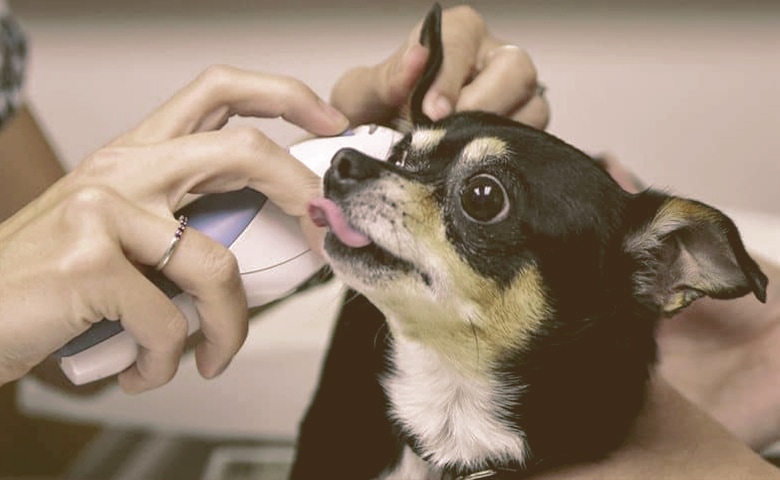
If you have noticed your dog has stopped eating or is no longer interested in their food at mealtimes, you can perform a simple at-home checkup to see if you might be able to diagnose the problem.
However, this at-home checkup may reveal a more serious condition in which you would need to seek medical help from a vet as soon as possible.
The following list is the steps to perform an at-home check up on your dog:
- Check their gums – They should be pink or light pink without any tinge of blue or gray.
- Take their temperature – It should be around 100 degrees Fahrenheit.
- Feel their stomach area – There should not be any noticeable lumps or bumps under the skin.
- Look at their eyes – Their eyes should not appear sunken into the eye sockets nor should they have excessive discharge coming from one eye (unless you know the discharge is caused by allergies).
- Observe their water intake – How much water they drink each day should average 1/2 cup per 10 pounds of body weight daily but could vary depending on activity level, age, and environment.
- Inspect their throat – It should be pink without any signs of inflammation or redness
- Check their stool for consistency – It should not be watery or contain red or black spots (a common sign of blood) and your dog should have a bowel movement at least once every two days.
If your dog is not eating and any of the above symptoms are present, call your vet. It is time to go in for an appointment and make sure that these symptoms are not a sign of a more serious illness.
The best treatments are going to be prescribed by the vet. The vet can prescribe the dog medication for nausea and vomiting. They may also need to be hospitalized if they are not eating or able to keep food down long enough to provide nourishment.
Some Common Reasons Causing A Dog to Stop Eating
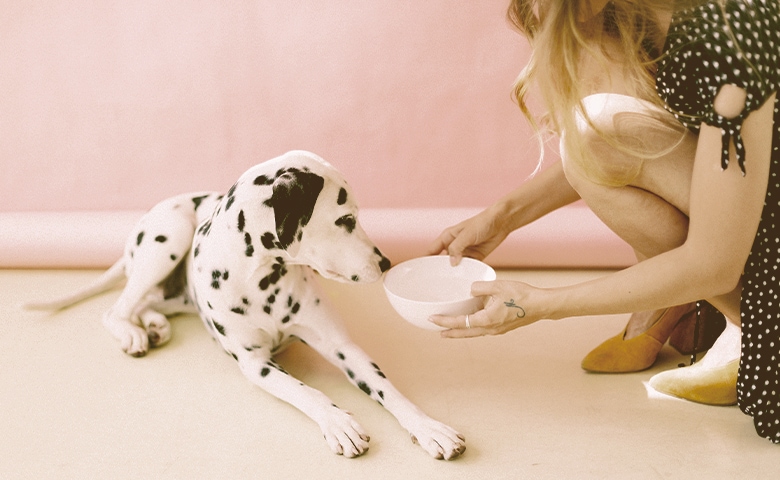
Sometimes it is not a difficult issue to treat and the vet can simply take care of it. Many times, the vet will be able to diagnose and treat your dog with medication or a special diet.
Many common problems that cause dogs to stop eating are easily treatable, though sometimes it can be more difficult for the vet to get in touch with what is wrong and they will need some observation time before coming up with a diagnosis.
Common Non-Severe Reasons A Dog Stops Eating
The most common reasons that dogs stop eating are:
- Their teeth need brushing or a professional cleaning by their veterinarian
- They have an upset stomach
- They might not like what you’re feeding them
Important Signs of Illness In Your Dog
However, sometimes some signs point to a more serious condition. If you notice the following, your pet should be examined by a vet as soon as possible:
- Abnormal behavior – If your dog is displaying uncommon behaviors resulting in a drastic personality change, it is time to see a vet.
- Appetite loss or weight loss – Even if they’re eating something else instead of their normal food. Again, this might indicate an underlying medical condition that needs to be addressed by a vet and might require hospitalization.
- Blackened nostrils, or a dry nose – This also needs attention from your vet, as it may be indicative of pneumonia.
- Changes to their fur coat – This may also be a sign of an underlying medical condition, like allergies. If you notice their coat is not as shiny as usual contact your vet to get them checked out.
- Difficulty breathing – This is not a problem that should be taken lightly, wheezing, coughing or abnormal breathing sounds are cause for concern. Contact your vet immediately.
- Fever – If you notice a fever above 103 degrees Fahrenheit, contact the vet immediately. A fever can be a sign of several different illnesses, so make sure you have a list of possible other symptoms as well to help narrow down the diagnosis.
- Lethargy – If you notice your dog no longer wants to play like it used to and is always lethargic, it is something you should bring up with the vet. This is especially true if coupled with some of the other signs we have mentioned.
- Loss of hair or excessive shedding – This can indicate a skin infection like mange that needs to be addressed by a vet, who can prescribe medication for the dog.
If your vet determines that there is a problem, make sure you feed them a consistent diet and give them lots of water as well. This will help the dog regain their appetite more easily after treatment for any disease is started.
Simple Solutions You Can Try Before Going to the Vet
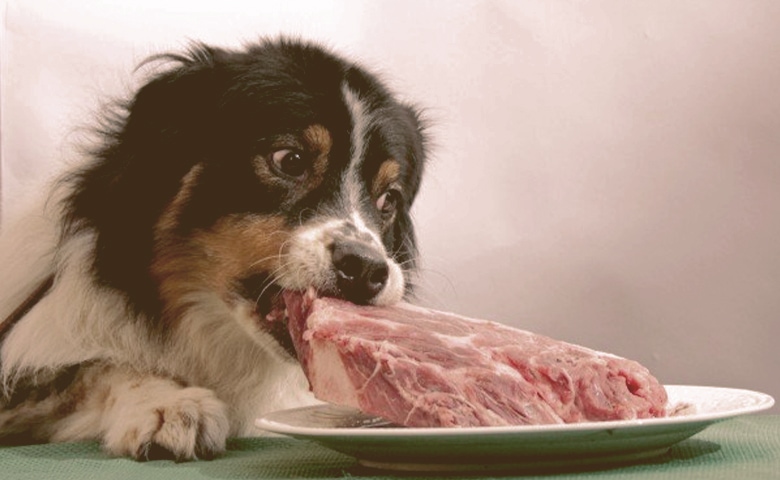
Luckily there’s a chance that you can help them get back on their feet simply by taking these steps:
- Feed your dog raw or soft food – Things like hard-boiled eggs and meat are good options.
- Give them canned pumpkin to soothe their stomach – This is a great choice, as long as you know your dog is not allergic first!
- Offer small meals at set intervals – Sometimes the timing of a dog’s meals can be the problem. You should be feeding your dog the equivalent of one cup for every 25 pounds of body weight per day.
If your dog is still unresponsive to the above tactics, it is time to go to the vet.
Things To Know When You Go To The Vet
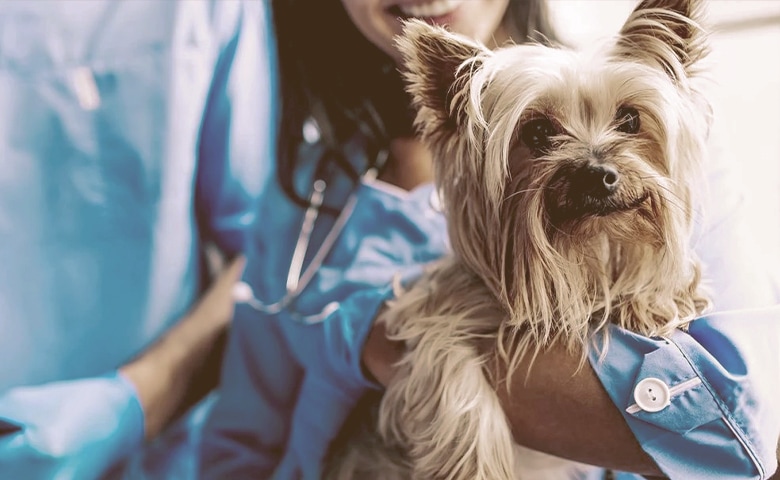
Going to the vet for anything outside of a routine checkup or care appointment for your dog can be scary. But there is no need to worry because the vet will take care of your dog and make sure it gets the best care possible.
What to Expect at the Vet’s Office?
Your vet will examine your pup and perform blood work if necessary, before determining what the issue might be.
They will then prescribe treatment based on their findings which could include medication, dietary changes, surgery, or other treatments depending on the diagnosis.
When Should You Make An Emergency Trip?
The following are a list of situations that constitute an emergency visit to the vet’s office:
- For any breathing difficulties such as coughing, wheezing or labored breathing.
- If either his droppings are too hard and dry, or they contain blood.
- If you suspect that he may have consumed something poisonous, even if his appetite appears to be normal.
- If your dog has not eaten at all or less than usual for more than 24 hours.
Always call the vet before coming in so that they can make sure a staff member is waiting for you when you arrive with your pet! The quicker the office staff can get started on treatment, the better chance of recovery, especially in severe cases.
Questions to Ask Your Vet About Health Concerns
When you are at the vet’s office for an emergency or stressful situation, you may not be able to think of the best questions to ask. We have you covered, so there is no need to stress about getting the information you need from your vet.
The following are a list of questions you can ask your vet if you have health concerns about your dog:
- How can I prevent this from happening again in the future?
- How severe is the dog’s condition?
- How should I take care of my dog while they are sick?
- Is it possible to treat at home or do they need hospitalization for treatment?
- Is there any follow-up information that will be helpful for me to know or do?
- What is causing this behavior?
- When should I come back if my dog does not become well soon enough?
Remember if you forget to ask important questions, you can always call them in the future. Most vets are very good at explaining the issue and how to solve the problem.
In Summary: Do Not Wait To Get Your Dog Help
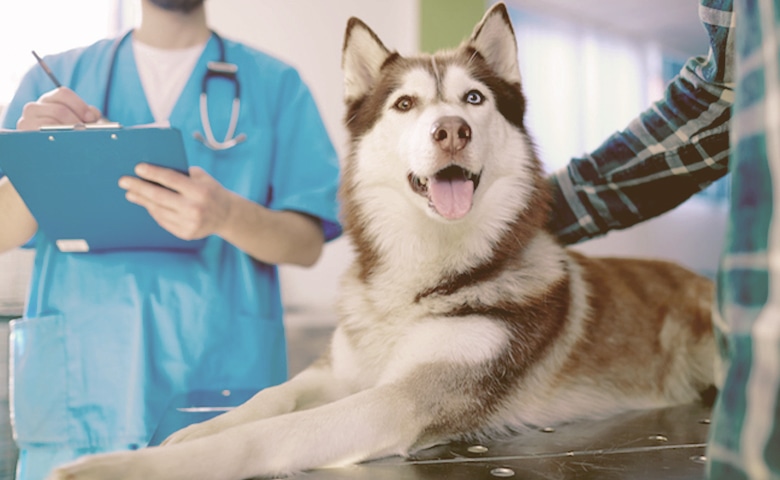
The sooner you get treatment for your dog’s condition, the better chance they have at recovering. If your dog is not eating, it can be a sign of many different things. You should always consult with a veterinarian to determine the cause and find the best treatment for your pet.
And above all, do not wait to get help. If you know something is off about your pet’s behavior it is your job to care and advocate for them.
Sources
Acoma Animal Clinic
The American Kennel Club
The American Kennel Club
VCA Hospitals
Healthline

